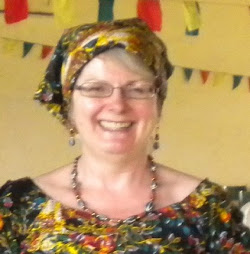Cameroon is so rich in natural resources, it's hard to understand why the country is so poor. Our in-country training here in the capital, Yaounde, is just a first step at finding out. I certainly don't expect to get all the answers in the 8 weeks that I'm here.
 In VSO UK training they talk about a foreign culture as being like an iceberg. We volunteers are like seagulls landing on the iceberg for a short stay. How do we find out what's happening beneath the surface? Find some friendly penguins and ask them!
In VSO UK training they talk about a foreign culture as being like an iceberg. We volunteers are like seagulls landing on the iceberg for a short stay. How do we find out what's happening beneath the surface? Find some friendly penguins and ask them!A visit to Mont Febe monastery and museum gave us fine views over the hazy city, spreading over its hills. The museum gave us a glimpse of a rich ancient culture, with over 230 ethnic groups and languages. Folk here smile a lot, and we could see that in the wood and clay figurines from older times.
People feel a strong loyalty to their kith and kin, their community, in ways we seem to have lost in our world. These cultural differences are going to be the toughest things to learn, and to accept that things are not better or worse, just different. As an example, a cultured, western-educated, middle-aged professional told us that when he goes back to the village, he doesn't speak his opinion until his uncle has spoken, and then he does not contradict his uncle in front of other people. He has to find another way around it. Tact, discretion, empathy - a lot to learn here.
I'm looking forward to seeing the land when I travel to the north west province on Saturday. Cameroon has the whole of Africa in one place, (about twice the size of the UK I think). Three volunteers are going up to the Far North, a desert region bordering Chad with temperatures in the 40s. Ten of us (including the 5 Welsh volunteers) are going to the north west, a hilly region of grasslands, arable crops, forests.
Our trainers tell us there is an abundance of food in Cameroon, with a wide variety, but 40% of the people go hungry. Seven out of about 20 million population live in poverty. What can we do to help?



No comments:
Post a Comment